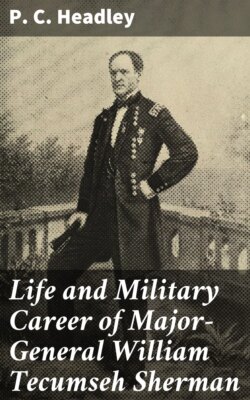Читать книгу Life and Military Career of Major-General William Tecumseh Sherman - P. C. Headley - Страница 10
На сайте Литреса книга снята с продажи.
CHAPTER VI.
ОглавлениеTable of Contents
Sumter falls—Sherman repairs to Washington—His Interview with the Secretary of War and the President—His Prophetic Insight of the Threatening Times—The state of the Country—Rebel Expectations.
HE traitorous Secretary of War, John B. Floyd, had not lost sight of the probable uprising of the South at no distant period, for a moment, during all of his official career. Every fort on her soil was made an easy prey to her rebellious hand by reducing their garrisons.
The magnificent Fortress Monroe, on which the United States had expended nearly two and a half millions, could muster only eight companies of artillery. The forts, Moultrie, Pinckney, and Sumter, of Charleston harbor, had only eighty men, who were in Fort Moultrie.
And yet, had you been in the Halls of Congress when Mr. Clarke, of New Hampshire, offered a resolution of inquiry into the condition of those defences, you would have heard a storm of apparently virtuous indignation from Jefferson Davis and his fellow-conspirators, as if the intimation of treachery were an insult to Southern chivalry.
A week later General Anderson and his band, loyal to the national banner, having become assured that their capture with Fort Moultrie was designed, after destroying its equipment as far as possible, stole at dead of night from its walls and floated over the waters to silent Sumter, whose massive battlements promised a safer refuge from the passions of infatuated men. The rebels immediately seized Forts Moultrie and Pinckney; and ten days later the Star of the West, an unarmed steamer conveying a reënforcement of two hundred and fifty soldiers and supplies for the destitute garrison, was fired upon from newly-erected earthworks.
The spring came with flowers and birds, but the angry storm of rebellion beat around Sumter with increasing fury. Iron-clad batteries had risen on every hand to cut off the approach of our ships, and grim ordnance now pointed toward the old fortress.
April 12th a messenger approached it with a very brief message to Major Anderson; it was, “Surrender!” The reply was nearly as short: “His sense of honor and his obligations to the Government would prevent compliance.”
A few hours after, and “boom! boom!” was the sound, followed with shot and shell, against Sumter’s walls, which opened a bloody civil war. In the iron hail the fort was scarred, and its ground covered with exploding shells. At length the band, one-third the number of the famous warriors at Thermopylæ, against ten thousand, saw the hopelessness of resistance, and made honorable terms to themselves, of surrender. Every telegraphic wire in the land, North and South, trembled to the tidings of the battle hour.
The Hon. Thomas Ewing wrote Charles Taylor Sherman, of Washington, the brother of William Tecumseh, to use his influence to get the latter again into the army. He felt that he was, and would be needed. The intelligent, patriotic mind of the captain did not require light for action, but only opportunity.
Our railroad superintendent at St. Louis thought that all observant people must see that a terrible conflict had begun, and like Grant in Galena, left his office to offer his services to the Government, and his life, if that should be the sacrifice, included in their acceptance. He hastened to the nation’s capital. Soon after reaching Washington he called on Secretary Cameron.
“Mr. Secretary, civil war is imminent, and we are unprepared for it. I have come to offer my services to the country in the struggle before us.”
“I think,” replies Mr. Cameron, “the ebullition of feeling will soon subside, we shall not need many troops.”
Indeed the Secretary was quite surprised, if not annoyed, at the earnestness of Captain Sherman. He next sought an interview with the President, and made a similar statement and offer to him. The good President was inclined to take the whole thing as a joke. After listening to the serious enthusiasm expressed in the strong appeal, he replied, pleasantly: “We shall not need many more like you; the whole affair will soon blow over.”
He left the Chief Magistrate of a republic whose very existence he knew was assailed, with a shadow of disappointment on his brave, loyal spirit—not for himself, but for the cause near his heart. Friends then advised him to go to Ohio and superintend the organization of three months’ men there. He declared “it would be as wise to undertake to extinguish the flames of a burning building with a squirt gun, as to put down the rebellion with three months’ troops.”
To talk of any thing less than a gigantic war was to him absurd. But he was then nearly alone in his just estimate of the struggle.
